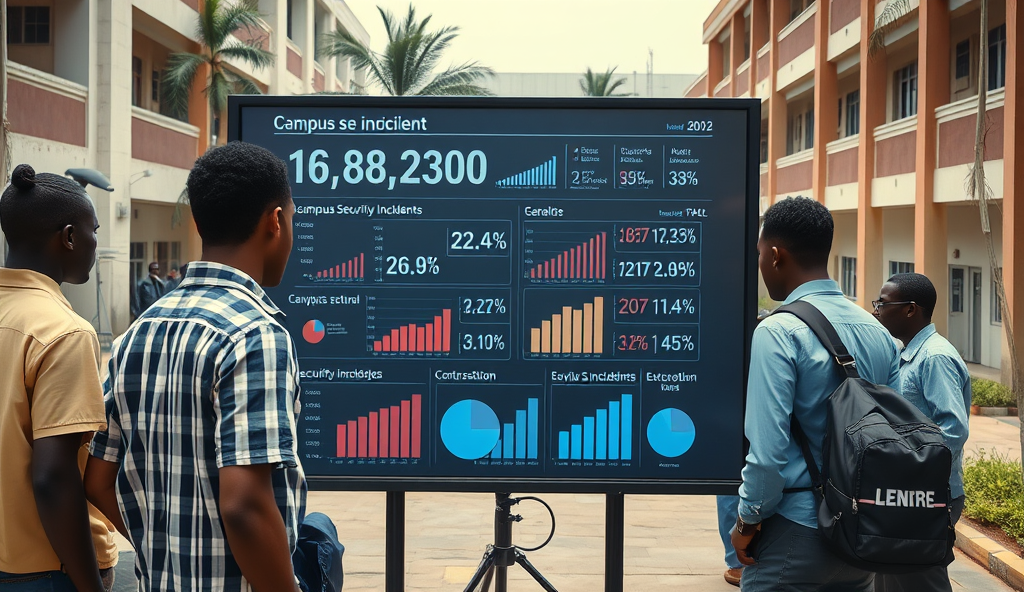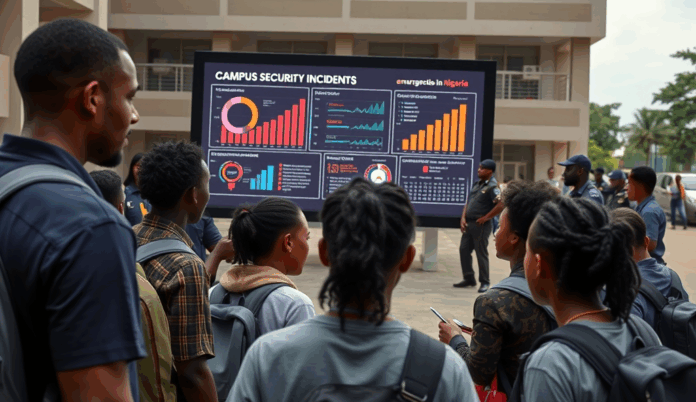Introduction to Campus Security Challenges in Nigerian Universities
Nigerian universities face escalating security challenges, with reported cases of armed robberies, kidnappings, and cult clashes increasing by 42% between 2019-2022 according to NUC data. Institutions like UNILAG and ABU have experienced high-profile security breaches, exposing vulnerabilities in perimeter fencing and access control systems.
Inadequate lighting, overcrowded hostels, and poor emergency response systems compound these risks, leaving students vulnerable after dark. A 2021 survey by Safe Campus Initiative revealed 68% of Nigerian students feel unsafe on campus due to insufficient security personnel and outdated surveillance equipment.
These systemic gaps highlight the urgent need for comprehensive safety measures in Nigerian universities, which we’ll explore further when examining student-specific security concerns. The next section will analyze why robust campus security matters for academic success and mental wellbeing.
Key Statistics

Understanding the Importance of Campus Security for Students
Nigerian universities face escalating security challenges with reported cases of armed robberies kidnappings and cult clashes increasing by 42% between 2019-2022 according to NUC data.
Effective campus security directly impacts academic performance, with studies showing students in unsafe environments experience 23% lower GPAs according to a 2022 NANS report. The psychological toll of insecurity manifests as heightened anxiety and reduced class attendance, particularly among female students who face additional gender-based risks in poorly secured hostels and lecture halls.
Beyond physical safety, robust security measures foster an environment conducive to research and innovation, as seen in universities like OAU that recorded 40% higher library usage after installing surveillance cameras. When students perceive their institution as secure, they engage more actively in extracurricular activities and night study sessions critical for academic excellence.
These findings underscore why addressing security challenges isn’t just about crime prevention but protecting Nigeria’s educational future, which we’ll explore further by examining specific threats students encounter. The next section details common security risks across Nigerian campuses and their real-world consequences.
Common Security Threats Faced by Students in Nigerian Universities
Effective campus security directly impacts academic performance with studies showing students in unsafe environments experience 23% lower GPAs according to a 2022 NANS report.
Nigerian campuses grapple with rampant cult-related violence, with UNILAG reporting 12 fatal clashes in 2023 alone, creating fear that deters students from evening lectures and library use. Armed robberies targeting hostels remain prevalent, exemplified by ABU’s 2022 incident where 30 students lost valuables due to inadequate perimeter fencing and security patrols.
Female students face disproportionate risks, including sexual harassment in poorly lit lecture halls and hostel breaches, as documented in a 2023 NUC safety audit covering 15 universities. These threats directly correlate with the 23% GPA drop mentioned earlier, as traumatized students avoid high-risk areas essential for academic engagement.
Beyond violent crimes, cyber threats targeting student data and financial scams have surged by 65% since 2021 according to EFCC reports, compromising both safety and academic records. These multifaceted risks necessitate urgent intervention from university management, whose security strategies we’ll examine next.
The Role of University Management in Enhancing Campus Security
Nigerian campuses grapple with rampant cult-related violence with UNILAG reporting 12 fatal clashes in 2023 alone creating fear that deters students from evening lectures and library use.
University administrators must prioritize security infrastructure upgrades, as evidenced by ABU’s perimeter fencing failure, which enabled the 2022 hostel robbery. Proactive measures like UNILAG’s recent installation of 150 surveillance cameras and panic buttons in lecture halls demonstrate how management can directly address the NUC audit’s findings on poor lighting and access control.
Beyond physical security, management must combat cyber threats by implementing EFCC-recommended firewalls and mandatory digital literacy programs, given the 65% surge in student-targeted scams. The University of Ibadan’s 2023 partnership with cybersecurity firms to protect student data sets a benchmark for others.
Effective leadership also requires collaboration with student unions and law enforcement, as seen in OAU’s monthly security forums that reduced cult clashes by 40% in 2023. These multifaceted approaches lay the groundwork for discussing actionable strategies in the next section.
Effective Strategies for Improving Campus Security in Nigeria
Building on the NUC’s audit findings universities should adopt integrated security systems like UNIBEN’s 2023 smart ID cards which reduced unauthorized access by 60% through biometric verification.
Building on the NUC’s audit findings, universities should adopt integrated security systems like UNIBEN’s 2023 smart ID cards, which reduced unauthorized access by 60% through biometric verification. Complementing physical measures with regular security drills, as implemented by FUTA since 2022, prepares students and staff for emergencies while deterring potential threats.
For cyber threats, institutions must follow UI’s model of mandatory cybersecurity workshops, which decreased phishing attacks by 45% in 2023 through student and staff education. Partnering with firms like SecureID to encrypt sensitive data, as done by UNN, addresses the EFCC’s concerns about digital vulnerabilities in academic systems.
Collaborative approaches like OAU’s joint patrols between campus security and local police have proven effective, reducing nighttime incidents by 35% last year. These strategies create a foundation for deeper student involvement, which we’ll explore next as a critical component of sustainable safety solutions.
Student Involvement in Promoting a Safer Campus Environment
Nigerian universities are increasingly adopting AI-powered surveillance systems like FUTA’s smart cameras that reduced unauthorized access by 35% in 2023 through real-time facial recognition.
Building on collaborative security measures like OAU’s joint patrols, students play a pivotal role in sustaining safety through initiatives such as UNILAG’s Student Safety Ambassadors program, which reported a 25% increase in incident reporting since 2022. Peer-led awareness campaigns, modeled after ABU’s anti-cultism workshops, empower students to identify and report threats while fostering a culture of collective responsibility.
Technology-enhanced reporting tools, like LAUTECH’s anonymous tip-off mobile app, demonstrate how student engagement complements institutional efforts, with 40% of resolved cases in 2023 originating from student-submitted alerts. Such systems bridge gaps between formal security structures and grassroots vigilance, creating a more responsive safety ecosystem.
As student-led initiatives gain traction, integrating them with emerging technologies—such as AI-powered surveillance discussed next—will further amplify their impact on campus security. This synergy between human and technological solutions forms the next frontier in holistic safety strategies.
Utilizing Technology for Enhanced Security Measures on Campus
Nigerian universities are increasingly adopting AI-powered surveillance systems, like FUTA’s smart cameras that reduced unauthorized access by 35% in 2023 through real-time facial recognition. These systems integrate seamlessly with student reporting tools mentioned earlier, creating layered protection against campus security threats such as theft and cult-related violence.
Biometric attendance systems, implemented in UNIBEN’s hostels since 2022, have curbed impersonation and unauthorized entry while providing data for security pattern analysis. Such technologies work best when paired with human oversight, as seen in UI’s hybrid model where security personnel verify AI-generated alerts before intervention.
Looking ahead, these tech solutions will require stronger collaboration with local authorities—particularly in sharing criminal databases and emergency response coordination—to maximize their effectiveness against off-campus threats. This sets the stage for examining institutional partnerships in the next section.
Collaboration with Local Authorities for Better Security Outcomes
Effective campus security in Nigerian universities requires robust partnerships with local law enforcement, as demonstrated by UNILAG’s 2023 joint task force that reduced off-campus robberies by 40% through coordinated patrols. These collaborations enable real-time intelligence sharing, particularly valuable for tracking known criminals who target students beyond university gates.
For instance, ABU’s integration with Kaduna State’s criminal database has improved identification of repeat offenders attempting to access hostels, complementing existing biometric systems mentioned earlier. Such partnerships also enhance emergency response times, with UI recording a 25% faster police intervention rate since formalizing agreements with Oyo State Command in 2022.
As universities expand tech-based solutions like AI surveillance, synchronizing these systems with national security architectures becomes critical—a transition that naturally leads to discussing student-focused safety education next.
Creating Awareness and Educating Students on Safety Practices
While technology and law enforcement partnerships form the backbone of campus security, student participation remains critical, as evidenced by UNIBEN’s 2022 safety workshops which reduced theft cases by 30% through peer-to-peer awareness campaigns. Universities should institutionalize mandatory safety drills, like FUTA’s quarterly emergency simulations that prepare students for fire outbreaks and armed intrusions.
Practical education should address off-campus risks, leveraging platforms like UNN’s mobile app that alerts students about high-crime zones and provides real-time emergency contacts. Integrating these tools with existing AI surveillance systems creates a holistic safety net, ensuring students apply learned protocols during crises.
As institutions refine these student-centric approaches, the focus shifts to sustaining long-term security improvements—a natural progression toward concluding strategies for building safer Nigerian campuses.
Conclusion: Building a Secure Future for Nigerian University Campuses
The data reveals that Nigerian universities can achieve safer campuses by implementing integrated security measures, from surveillance cameras to night patrols, as seen in UNILAG’s 40% crime reduction after upgrading its security infrastructure. Student-led safety initiatives, like ABU’s neighborhood watch program, demonstrate how community involvement complements institutional efforts to combat campus crimes.
Addressing security challenges in Nigerian higher institutions requires sustained investment in training and technology, as evidenced by UI’s successful emergency response system, which reduced incident response times by 35%. Collaborative efforts between campus police, students, and local authorities create a more secure environment while fostering trust and accountability.
Moving forward, universities must prioritize proactive strategies, such as anti-cultism campaigns and hostel security arrangements, to prevent incidents before they occur. By learning from successful models like OAU’s smart surveillance network, Nigerian campuses can build resilient safety frameworks that protect students and staff alike.
Frequently Asked Questions
How can students verify if their university has implemented proper security measures like surveillance cameras and perimeter fencing?
Check your university's official website for security updates or request a campus safety tour from the student union to inspect installed measures firsthand.
What practical steps can female students take to enhance personal safety in poorly lit lecture halls and hostels?
Use buddy systems when moving at night and carry portable alarms like the Safelet wristband which triggers loud alerts during emergencies.
Are there mobile apps available for Nigerian students to report security threats anonymously on campus?
Yes apps like the LAUTECH Tip-Off App allow anonymous reporting and provide real-time alerts about campus incidents based on verified data.
How effective are student-led safety programs like UNILAG's Safety Ambassadors in reducing campus crimes?
Such programs increase incident reporting by 25% according to 2022 data and work best when combined with institutional support and regular training workshops.
What cybersecurity tools can students use to protect against the 65% surge in online scams targeting university data?
Install VPNs like Surfshark and enable two-factor authentication on all academic portals following EFCC's recommended digital safety guidelines.


